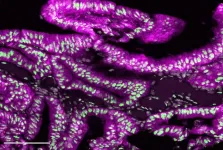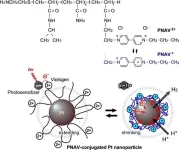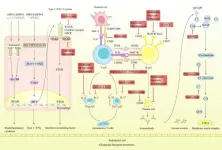(Press-News.org) Hard-to-detect colorectal pre-cancerous lesions known as serrated polyps, and the aggressive tumors that develop from them, depend heavily on the ramped-up production of cholesterol, according to a preclinical study from researchers at Weill Cornell Medicine. The finding points to the possibility of using cholesterol-lowering drugs to prevent or treat such tumors.
In the study, published Oct. 13 in Nature Communications, the researchers analyzed mice that develop serrated polyps and tumors, detailing the chain of molecular events in these tissues that leads to increased cholesterol production.
They confirmed their findings in analyses of human serrated polyps and tumors, and showed in mouse models that replicate the human cancer that blocking cholesterol production prevented the progression of these types of intestinal tumors.
“Serrated-type polyps and tumors currently are not treated differently from other colorectal neoplasias, but as our work shows, they have this specific metabolic vulnerability that can be targeted,” said study co-senior author Dr. Jorge Moscat, a Homer T. Hirst III Professor of Oncology in Pathology, Vice-Chair for Cell and Cancer Pathobiology in the Department of Pathology and Laboratory Medicine and a member of the Sandra and Edward Meyer Cancer Center at Weill Cornell Medicine.
The other co-senior author is Dr. Maria Diaz-Meco, also a Homer T. Hirst III Professor of Oncology in Pathology and a member of the Meyer Cancer Center at Weill Cornell Medicine. The study’s first author is Dr. Yu Muta, a postdoctoral associate in the Moscat/Diaz-Meco laboratories.
Cholesterol is generally considered a pro-growth molecule, being a building block for cell membranes and having other growth-supporting functions. Prior studies have linked high blood cholesterol levels to various cancers, including colorectal cancers. However, it hasn’t been clear that lowering cholesterol, for example with common statin drugs, can prevent colorectal cancers.
“Trials of statins to prevent colorectal cancer have had conflicting results,” Dr. Diaz-Meco said. “Our findings suggest that this is because targeting cholesterol has a preventive but selective effect only against polyps and tumors of this serrated type.”
Serrated polyps are so-called because of their sawtooth appearance under a microscope. They are flatter than ordinary colorectal polyps and can often be missed during colonoscopies. Yet the tumors into which they develop, which account for roughly 15 to 30 percent of colorectal cancers, contain many “metaplastic” cells that are particularly invasive and resistant to treatments.
Several years ago, the Moscat/Diaz-Meco team linked serrated polyps and tumors to low levels of two enzymes known as aPKCs. They showed that mice engineered to lack these aPKC enzymes in their gut linings reliably form serrated polyps and then aggressive tumors.
In the new study, the scientists found that in serrated-type tumors in these mice, and even in intestinal tissue poised to develop these types of cancerous lesions, cholesterol synthesis was strikingly upregulated, suggesting that cholesterol may be an early driver of tumor development.
The researchers revealed how the absence of aPKC enzymes, especially in metaplastic tumor cells, unleashes the activation of a transcription factor called SREBP2, which switches on cholesterol production. Tests on colorectal polyp and tumor samples from human patients dovetailed with the mouse findings. They found, for example, that only serrated-type tumors had low aPKC levels concomitant with the accumulation of SREBP2, a driver and a marker of upregulated cholesterol biosynthesis in the serrated cancer cells.
Lastly, the researchers tested a combination of two cholesterol synthesis-blocking drugs, including the widely used atorvastatin. The treatment, delivered when the low-aPKC mice were still quite young, significantly lowered the rate at which both serrated polyps and tumors later formed—and the serrated-type tumors that did form were less aggressive than those normally arising in the untreated mice.
The results indicate that targeting cholesterol could be a viable strategy for treating and preventing serrated-type colorectal tumors. The Moscat and Diaz-Meco labs are now hoping to set up an initial clinical trial of a cholesterol-lowering intervention in patients from whom serrated colorectal polyps have been removed.
“Currently when these polyps are detected early with colonoscopy, they are removed and patients have to hope that they don’t come back,” Dr. Moscat said. “In the future, we hope to have a more active method to prevent this very aggressive form of cancer before it is fully developed and more difficult to treat.”
Many Weill Cornell Medicine physicians and scientists maintain relationships and collaborate with external organizations to foster scientific innovation and provide expert guidance. The institution makes these disclosures public to ensure transparency. For this information, see profile for Dr. Jorge Moscat and Dr. Maria Diaz-Meco.
This research was supported in part by grants from the National Cancer Institute of the National Institutes of Health under award numbers: R01CA265892, R01CA250025, R01CA275846, R01CA246765, R50CA265332, R50CA252146, and R01CA234245. Project support for this research was provided in part by the European Union Horizon’s 2020 Grant (REVERT project GA848098), and the Center for Translational Pathology in the Department of Pathology and Laboratory Medicine at Weill Cornell Medicine.
END
Cholesterol-lowering therapy may hinder aggressive type of colorectal tumor
2023-12-13
ELSE PRESS RELEASES FROM THIS DATE:
Inequity in U.S. wildfire emergency response
2023-12-13
WASHINGTON, DC, 2023 – Recent U.S. wildfire events -- including the 2023 Maui wildfire in Hawaii, the 2022 Hermit’s Peak/Calf Canyon fire in New Mexico, and the 2020 Cameron Peak Fire in Colorado -- are tragic examples of how disadvantaged communities can suffer most during and after a wildfire. While all three fires had a devastating impact on an entire community, they disproportionately affected low-income populations who were left without adequate insurance or the financial means to rebuild their homes.
To study inequities in U.S. wildfire management, ...
When parents drink during Super Bowl, kids get harsh discipline
2023-12-13
COLUMBUS, Ohio – Parents who drank alcohol while watching the Super Bowl were more likely than those who abstained to use aggressive discipline on their children during the game, a new study shows.
Most of the parents in the study – more than 90% - were mothers, which is significant, said Bridget Freisthler, lead author of the study and professor of social work at The Ohio State University.
“The links between alcohol use, aggression and watching violent sports have been studied almost exclusively among ...
Reported drug use among adolescents continued to hold below pre-pandemic levels in 2023
2023-12-13
The percentage of adolescents reporting they used any illicit substances in 2023 continued to hold steady below the pre-pandemic levels reported in 2020, with 10.9% of eighth graders, 19.8% of 10th graders, and 31.2% of 12th graders reporting any illicit drug use in the past year, according to the latest results from the Monitoring the Future survey. Reported use for almost all substances decreased dramatically between 2020 and 2021, after the onset of the COVID-19 pandemic and related changes like school closures and social distancing. In 2022, most reported substance use among adolescents ...
Study: digital leisure reading does little to improve reading comprehension for students
2023-12-13
Washington, December 13, 2023—For years, research showed that print reading, whether for leisure or school, improved developing readers’ ability to comprehend text. However, the explosive use of digital reading devices, constant access to these devices, and new types of reading materials have introduced new reading habits. Now, a new comprehensive review of research on digital leisure reading habits finds a virtually nonexistent relationship between digital reading and improvement in reading comprehension among students.
The study was published in Review of Educational Research, a peer-reviewed journal of the American Educational ...
Towards next-generation nanocatalysts to revolutionize active electron transfer
2023-12-13
Ishikawa, Japan -- Various molecular systems have been developed by researchers for photoinduced (i.e., light-driven) electron transfer, including supramolecules, hybrid materials, and organic polymeric systems. While these systems fulfill the distance criterion required by the electron donor and acceptor for efficient electron transfer, they frequently fall short in accommodating molecular motion, especially in fluid environments. Is there a viable approach to design a system that facilitates electron transfer without succumbing to these limitations?
This issue has been specifically addressed in a recent study. ...
Helping more people get to safety in a wildfire
2023-12-13
WASHINGTON, DC, Dec. 13, 2023 – Wildfires pose an increasing threat to communities at the wildland-urban interface (WUI) – where dry, flammable vegetation borders back yards, often in remote locations. Despite the well-known danger, many communities at highest risk do not have a strong wildfire evacuation plan in place. (One of these was the town of Lahaina on Maui, where wind-driven wildfires killed nearly 100 people in August 2023.)
Researchers from UCLA’s John Garrick Institute for the Risk Sciences have built a new web-based software platform that allows emergency planners to design custom-made evacuation plans for their communities ...
Review in Chinese Medical Journal highlights the challenges and recent advances in targeted therapies for lupus nephritis
2023-12-13
Patients with lupus nephritis (LN), a severe complication of systemic lupus erythematosus (SLE), often undergo progressive kidney damage, with approximately 20% of these patients advancing to end-stage renal disease. The current therapeutic landscape for LN, dominated by glucocorticoids and immunosuppressants, is limited by suboptimal response rates, the risk of disease flare-ups and adverse effects, accentuating the necessity for safer and more effective treatment modalities. In the latest issue of the Chinese Medical Journal (CMJ) published online on December 15, 2023, a review authored by Dr. Wei Chen from the Department of Nephrology of the First Affiliated ...
Parker Institute for Cancer Immunotherapy (PICI) welcomes Weill Cornell Medicine to cancer research consortium
2023-12-13
San Francisco and New York — Dec. 13, 2023 — The Parker Institute for Cancer Immunotherapy (PICI), the largest concentration of immuno-oncology (IO) expertise in the world, announced it has added Weill Cornell Medicine to its network of preeminent academic and medical research institutions at the forefront of the fight against cancer. Under the agreement, Weill Cornell Medicine, with new PICI Network researchers, will establish a PICI immuno-oncology research center in New York City.
Since its inception, PICI has distributed $260 million to member researchers to support ...
Saving endangered species: New AI method counts manatee clusters in real time
2023-12-13
Manatees are endangered species volatile to the environment. Because of their voracious appetites, they often spend up to eight hours a day grazing for food within shallow waters, making them vulnerable to environmental changes and other risks.
Accurately counting manatee aggregations within a region is not only biologically meaningful in observing their habit, but also crucial for designing safety rules for boaters and divers as well as scheduling nursing, intervention, and other plans. Nevertheless, counting manatees ...
National cardiogenic shock initiative study results show significant increase in heart attack survival
2023-12-13
DETROIT (December 13, 2023) – Published results of a large, national heart attack study show that patients with a life-threatening complication known as cardiogenic shock survived at a significantly higher rate when treated with a protocol developed by cardiologists at Henry Ford Health, in collaboration with 80 hospitals nationwide.
Cardiogenic shock is a critical condition in which the heart is unable to pump enough blood to sustain the body’s needs, depriving vital organs of blood supply. This can cause those organs to eventually stop functioning. The typical survival rate of this deadly complication during a heart ...






